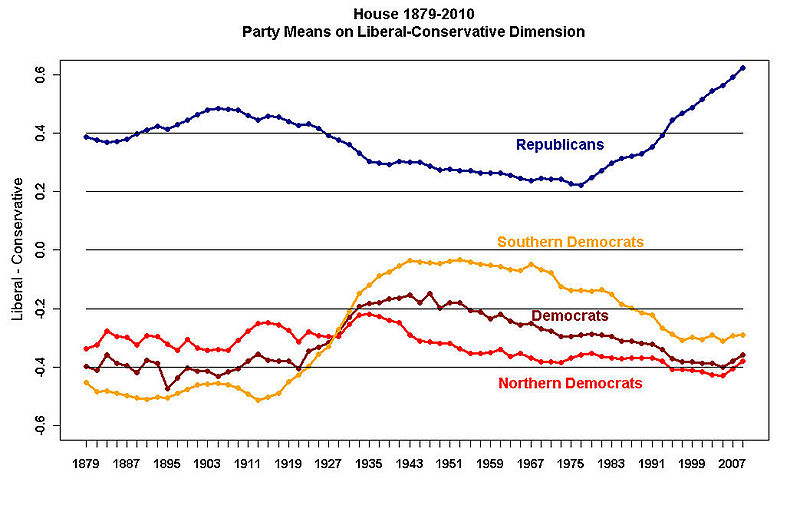Divided We Stand, United We Fall
Recently, as shown in this graph, the partisan divide has grown more polarized than ever.
October 26, 2018
While Nov. 6 creeps up on calendars, America stands in a murky political state. The technology that blossomed during the last decade has also become a refined weapon in political warfare. The algorithms constructing the echo chambers we browse through are the fuel of the deep divide America is in from every single mark on the census. Without breaking free from that secluded world, America’s unity will soon be only in name.
It’s easy to get wrapped up in extremist politics. Though globalism has interconnected the world, it has also led to a surge in the protection of identities— the rise of movements to drive out foreigners and the endless tacking of buzzwords to educate someone or to belittle an opponent. In addition, as people grow more reactionary to the words of others, America’s politics are becoming more emotion-based rather than logic-based.
When combined with the aforementioned echo chamber, this can take a steep turn. “Echo chamber” is a term describing the social media bubble people live in. As a person interacts with certain posts more often than others, the social network’s algorithms cater more of those kinds of posts to them and limit anything outside that person’s interest. Naturally, at some point, more extremist posts will surface and with that comes connecting with other people in the same political bubble. This ends up spawning a formerly niche online community that has since leaked into the real world.
Today, anecdotes of discriminatory encounters escalate to death threats. A statement from more than three years ago can surface and wreck an entire career. People justify violence against their opponents by reclaiming their identity’s history, such as minority protestors punching their perceived oppressors, the far-right, and vice versa. As this increases, so does the lack of unity in what seems to be nothing more than fifty regions spanning over three million square miles of land.
Fascination with this rift has only driven the point home further. Studies love emphasizing the differences between the right and left, whether in the usage of the left posterior insula vs. the right amygdala or the 20% growth of hate directed towards the opposing party over the past 20 years, as seen in a study by the Pew Research Center. Despite these differences, it’s important to realize that unless people look past their disagreements, America will not progress as a nation.
To rise above this and rebuild a politically divided White House, people first need to treat the online world with a healthy dose of skepticism. Technology is the world’s most powerful tool that can be used for education or ignorance. There’s the obvious fact-checking, but, in addition to this, a person has the power to shape their online world for better or for worse. Provided someone is able to either to see the transparency of a story or stay out of politics altogether, they can focus closely on the reality.
The world outside is a hub of ideas. Regardless of how opposed a person is, people have the right to express what they want to say. Sure, thoughts will clash, but this conflict can lead to in-depth discussion as long as people maintain neutrality. Opposing viewpoints do have some good arguments, and new ideas can arrive from conflicts between opposite perspectives.
Conflict is essential to growth, but too much of this conflict is not too good. As long as Americans disconnect and maintain an open mind, they can achieve the one goal that keeps them united: improving the country in hopes for a better future.






